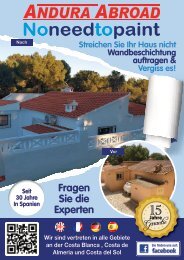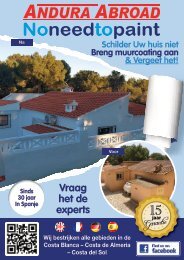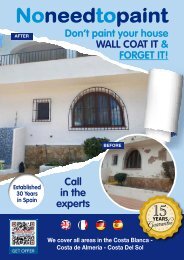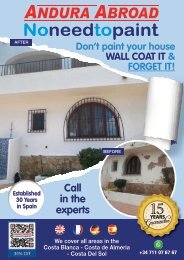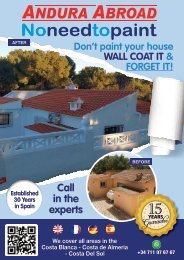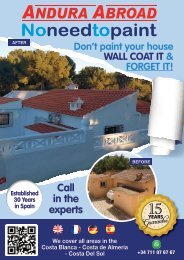Outandabout-Magazine-Oct-issue-191
Autumn in Costa Blanca is cool at night at amazingly hot during the day, there is always time to find a nice quiet cool place to read the latest edition of Out and About magazine which is all about what's going on locally with restaurants, bars, and entertainment. During autumn you can enjoy so much without having to worry too much about the heat and that's why we see more visitors from the UK and Norway than any other time of year.
Autumn in Costa Blanca is cool at night at amazingly hot during the day, there is always time to find a nice quiet cool place to read the latest edition of Out and About magazine which is all about what's going on locally with restaurants, bars, and entertainment. During autumn you can enjoy so much without having to worry too much about the heat and that's why we see more visitors from the UK and Norway than any other time of year.
Create successful ePaper yourself
Turn your PDF publications into a flip-book with our unique Google optimized e-Paper software.
Sir Ludwig Guttmann<br />
OCTOBER 2021 | 31<br />
Sir Ludwig Guttmann CBE FRS (3<br />
July 1899 – 18 March 1980) was<br />
a German-British neurologist<br />
who established the Stoke<br />
Mandeville Games, the sporting<br />
event for people with disabilities<br />
(PWD) that evolved in England<br />
into the Paralympic Games.<br />
A Jewish doctor who<br />
fled Nazi Germany<br />
just before the<br />
start of the<br />
Second World<br />
War, Guttmann<br />
was a founding father<br />
of organized physical<br />
activities for people<br />
with disabilities.<br />
Ludwig Guttmann<br />
was born on 3 July<br />
1899 to a German<br />
Jewish family in Tost<br />
in Upper Silesia in<br />
the former German<br />
Empire (currently<br />
Toszek, Poland), the son<br />
of Dorothy (Weissenberg)<br />
and Bernard Guttmann, a<br />
distiller. His family moved<br />
when he was three years old<br />
to the Silesian city of Königshütte<br />
(today Chorzów, Poland) where he passed<br />
his Abitur at the humanistic grammar school in<br />
<strong>191</strong>7 before he was called up for military service.<br />
Guttmann encountered his first paraplegic<br />
patient, a coal miner with a spine fracture,<br />
while volunteering at an accident hospital in<br />
Königshütte. The patient later died of sepsis.<br />
[ Guttmann started his medical studies in April<br />
<strong>191</strong>8 at the University of Breslau. He transferred<br />
to the University of Freiburg in <strong>191</strong>9 and received<br />
his Doctorate of Medicine in 1924.<br />
By 1933, Guttmann was working in Breslau<br />
(now Wrocław, Poland) as a neurosurgeon and<br />
lecturing at the university. Guttmann learned<br />
from the pioneer of neurosurgery Otfrid<br />
Foerster at his research institute. Despite having<br />
worked successfully as first assistant to Foerster,<br />
Guttmann was expelled from his<br />
university appointment and his<br />
job in 1933 under the Nuremberg<br />
Laws and his title changed to<br />
“Krankenbehandler” (one who<br />
treats the sick). With the arrival<br />
of the Nazis in power, Jews were<br />
banned from practising medicine<br />
professionally, and he was<br />
assigned to work at the Breslau<br />
Jewish Hospital, where he became<br />
medical director in 1937. Following<br />
the violent attacks on Jewish people<br />
and properties during Kristallnacht on<br />
9 November 1938, Guttmann ordered his staff<br />
to admit any patients without question. The<br />
following day, he justified his decision on a<br />
case-by-case basis with the Gestapo. Out of 64<br />
admissions, 60 patients were saved from arrest<br />
and deportation to concentration camps.<br />
Escape to Britain<br />
In early 1939, Guttmann and his family left<br />
Germany because of the Nazi persecution of the<br />
Jews. An opportunity for escape had come when<br />
the Nazis provided him with a visa and ordered<br />
him to travel to Portugal to treat a friend of the<br />
Portuguese dictator António de Oliveira Salazar.<br />
Guttmann was scheduled to return to Germany<br />
via London, when the Council for Assisting<br />
Refugee Academics (CARA) arranged for him<br />
to remain in the United Kingdom. He arrived<br />
with his wife Else Samuel Guttmann and two<br />
children, a son, Dennis, and a daughter, Eva age<br />
6 in Oxford, England, on 14 March 1939. CARA<br />
negotiated with the British Home Office on<br />
their behalf, and gave Guttmann and his family<br />
£250 (equivalent to £16,000 in 2019) to help<br />
settle in Oxford. Guttmann continued his spinal<br />
injury research at the Nuffield Department of<br />
Neurosurgery in the Radcliffe Infirmary. For the<br />
first few weeks after arrival the family resided in<br />
the Master’s Lodge of Balliol College (with the<br />
Master Sandie Lindsay) until they moved into<br />
a small semi-detached house in Lonsdale Road.<br />
] Both children were offered free places by the<br />
headmistress of Greycotes School. The family<br />
were members of the Oxford Jewish community,<br />
and Eva remembers becoming friendly with




